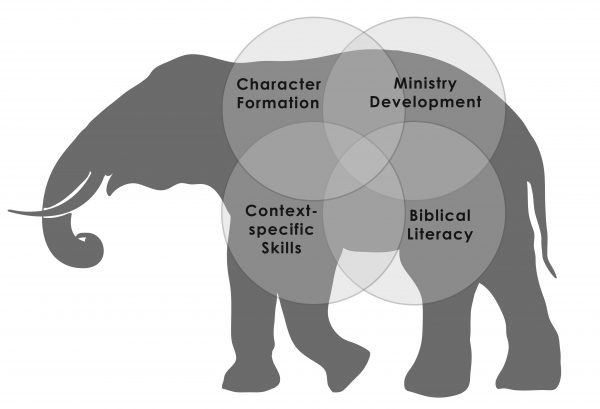Effective Christ-Centered Leadership
Over the past five weeks we’ve examined what we mean when we refer to “leadership development” (specifically, that which is Christ-centered). This is a term that is widely used but not commonly defined among churches, ministries, and organizations. Rather than run the risk of becoming like the Wild West of the 19th century, we’ve tried to come to terms with what leadership development means and what it contains. Today we conclude this series.
Last week examined the categories for effective Christ-centered leadership development that make up its components. An organization or ministry may focus on one or more of these categories.
- character formation
- biblical literacy
- context-specific skills
- ministry development
By sizing up the task before us, knowing we are functioning in these categories, we think that all’s well that ends well, right?
Yes, but here’s the caveat.
Research shows that “while every emerging Christ-centered leader needs all four of these categories to be truly effective, no single school or service provider is proficient to develop leaders effectively in all four categories.1”
Let us illustrate with a story. You may be familiar with it.
The Blind Men and the Elephant
There was a large elephant in the camp. Five blind men approached the elephant, each one touching a different part of the elephant. One declared that it was like a tree. Another stated that it was like a snake or rope. A third insisted that it was like a stone wall. The fourth argued that it was actually a spear. The fifth guy concluded that it was like a fan. And there was much fighting in the land. Meanwhile, a wise old man was observing all this and said simply, “Yes, each of you are partly right, but you are also all in the wrong.”
This parable originating from South Asia has been used throughout the centuries primarily to teach religious and social tolerance. The story ends by comparing the blind men to leaders and learned men who blindly and ignorantly hold to their views while disregarding the contribution of the other.
A Comprehensive Developmental Approach
So, if we were to apply this story to leadership, the “elephant” would represent the discipline of cultivating leaders. And if the whole picture of this elephant- the discipline of cultivating leaders- is intended to “establish and enhance effective Christ-centered leadership practices,” then emerging leaders need a comprehensive developmental approach.

In other words, rather than spending all of our time arguing about it, we need to come together and recognize that all four categories are essential, not just one or two of them.
We Need Each Other
Therefore, if my leadership organization focuses on ministry development and character formation, and your leadership organization focuses on biblical literacy, then I’m going to humbly recognize that not only do I need you, I can also benefit from partnering with you.
In the book Leading with Story: Cultivating Christ-centered Leaders in a Storycentric Generation, Rick Sessoms summarizes this phenomenon with these words:
Hundreds of initiatives worldwide aim to develop Christian leaders. While no single provider is developing leaders effectively in all four categories, many of these providers are doing a commendable job of cultivating leaders effectively in one or two of these categories. For example, seminaries and Bible colleges usually excel at equipping leaders in the areas of theology, doctrine, and church history (biblical literacy) as well as some preaching and pastoral counseling (context-specific skills), but they rarely emphasize the leadership competencies associated with ministry development. Conversely, a vast number of non-formal leadership development entities focus on character formation, but they are not usually equipped to deliver the expertise in the classic leadership disciplines that seminaries provide. This is not a problem as long as these developmental entities recognize their limitations and the need to cooperate with others that specialize in the other developmental categories. However, there is a big problem when providers compete with one another and “blindly” function as though their developmental program addresses the whole elephant. As a result, emerging leaders, the ministries they lead, and the people who follow them all suffer the consequences.
After all, there’s too much work to be done in the world to be competing for the elephant.
1Sessoms, Rick. Leading with Story: Cultivating Christ-centered Leaders in a Storycentric Generation. William Carey Library: 2016.
Leave a Reply